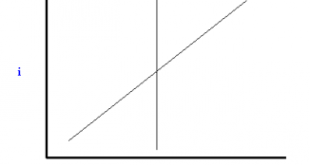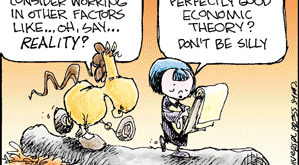Is MMT nothing but Knapp + Lerner + Minsky + Vertical IS curve? Turning to Brad’s challenge, some of the answers will now be obvious. Do we accept the elements he lists as fundamental to MMT? Knapp: yes indeed. He’s always been there … Lerner: dealt with above. What we reject is the aggregate demand approach to full employment and price (and financial) stability. As Minsky argued in the 1960s, pump-priming might get you to full employment but it will never...
Read More »How to make economics a relevant science again
How to make economics a relevant science again Economists are struggling to explain recent productivity developments, the implications of rising inequality, the impact of persistently negative interest rates in the eurozone … and the sudden slowdown in European growth … None of this is a huge surprise, given the profession’s embrace of simplistic theoretical assumptions and excessive reliance on mathematical techniques that prize elegance over real-world...
Read More »MMT and heterodoxy — necessary for the renewal of economics
MMT and heterodoxy — necessary for the renewal of economics A sense of failure is, for all intents and purposes, being translated into a context of relative success requiring more limited changes – though these are still being seen as significant. Part of the reason that they are seen as significant is that changes from within mainstream economics do not have to be major in order to appear radical. It is our contention that heterodox economics is being...
Read More »Your model is consistent? So what?
Your model is consistent? So what? In the realm of science it ought to be considered of little or no value to simply make claims about the model and lose sight of reality. There is a difference between having evidence for some hypothesis and having evidence for the hypothesis relevant for a given purpose. The difference is important because scientific methods tend to be good at addressing hypotheses of a certain kind and not others: scientific methods come...
Read More »Brad DeLong admits neoliberal era has come to an end
Brad DeLong admits neoliberal era has come to an end Should Democrats lean away from market-friendly stances and get comfortable with big government again? Should they embrace an ambitious 2020 candidate like Sanders and policies like the Green New Deal, or stick with incrementalists like former Vice President Joe Biden and more market-oriented ideas like Obamacare? One of the most interesting takes I’ve seen on this debate came from Brad DeLong, an...
Read More »MMT and the need for taxing the rich
MMT and the need for taxing the rich Some inflation might be good, in particular if it allows for higher real wages, something sorely needed. How much inflation? Difficult to say, but the structure of the Fed is not going to vanish, and higher rates would be used to discipline the labor class, with the support of many neoliberal Dems … The limits to fiscal expansion would be political, not economic, and there is no reason for the left to be up in arms...
Read More »Stephanie Kelton explains MMT
Stephanie Kelton explains MMT [embedded content] As has become abundantly clear during the last couple of weeks, it is obvious that most mainstream economists seem to think the ideas that Kelton explains so well here is something new that some wild heterodox economic cranks have come up with. That is actually very telling about the total lack of knowledge of their own discipline’s history these modern mainstream guys like Summers, Rogoff and Krugman have....
Read More »Modelling an uncertain world
Modelling an uncertain world In a very personal discussion of uncertainty and the hopelessness of accurately modeling what will happen in the real world, Nobel laureate Kenneth Arrow – in “I Know a Hawk From a Handsaw,” in M. Szenberg, ed., Eminent Economists: Their Life Philosophies, Cambridge University Press (1992) – writes: It is my view that most individuals underestimate the uncertainty of the world. This is almost as true of economists and other...
Read More »Il n’y a pas de vérité économique
Il n’y a pas de vérité économique [embedded content]
Read More »L’école post-keynésienne
[embedded content]
Read More » Heterodox
Heterodox








